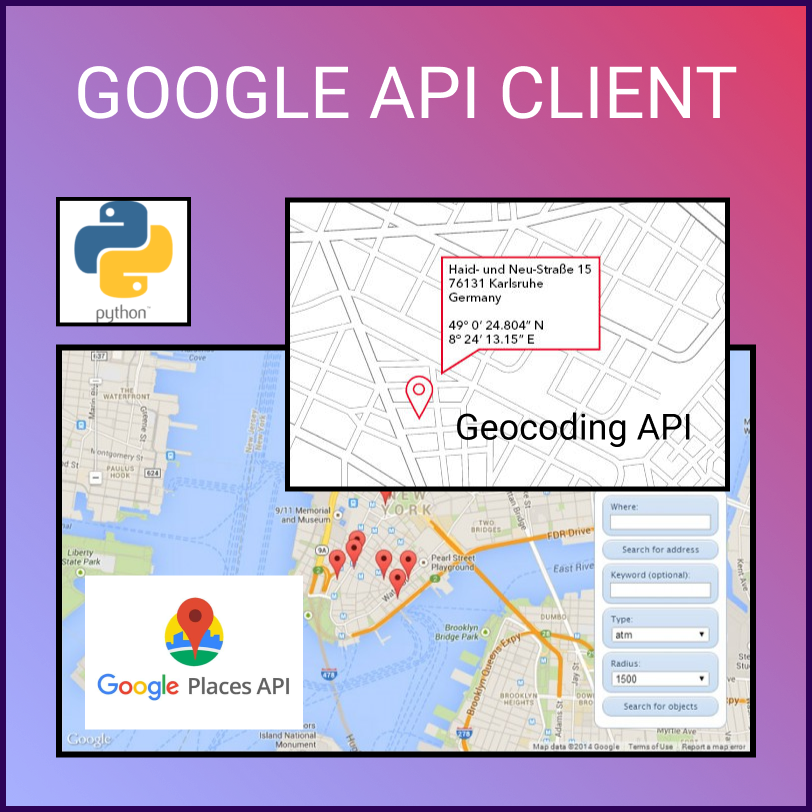Topics -> googleapiclient, geocoding, placesapi, programming, scripting
Source Code Link -> GitHub
What We are going to do?
- Installing required libraries and setting client
- Getting longitude and latitude by city or state name
- Finding things/places around a location within some radius
- Getting place details using the google place id
Step 1 -> Writing GoogleApiClient and exporting data (GoogleApiClient.py)
Writing GoogleApiClient
Installing required libraries
pip install requests
pip install requests
Importing libraries and setting API key
import requests
from urllib.parse import urlencode
GOOGLE_API_KEY = "ENTER YOUR OWN API KEY"
Be sure to enter your key.
Initiating the client
class GoogleMapsClient(object):
lat = None
lng = None
data_type = "json"
default_address = None
api_key = None
setting default_address and key in client
class GoogleMapsClient(object):
lat = None
lng = None
data_type = "json"
default_address = None
api_key = None
def __init__(self, api_key=None, default_address=None, *args, **kwargs):
super().__init__(*args, **kwargs)
if api_key is None:
raise Exception("Api key not found")
self.api_key = api_key
self.default_address = default_address
if default_address is not None:
self.get_url_and_log_lat()
else:
raise Exception("default address not set")
Step 2 -> Getting longitude and latitude by city or state name.
What happening in the below code?
- IF location is not given, it will set the location to default location
- Else location is set to given input.
- Once location is defined, we frame url with the help of default type i.e JSON
- We pass the key and the location as query parameter.
- Used the requests library to get request.
- Then, extract the lat and long and return it.
Code
def get_url_and_log_lat(self, location=None):
loc_query = self.default_address
if location is not None:
loc_query = location
base_url = f"https://maps.googleapis.com/maps/api/geocode/{self.data_type}"
paramaters = {
"address": loc_query,
"key": self.api_key
}
url_params = urlencode(paramaters)
endpoint = f"{base_url}?{url_params}"
r = requests.get(endpoint)
if r.status_code not in range(200, 299):
return {}
log_lat = {}
try:
log_lat = r.json()['results'][0]['geometry']['location']
print(log_lat)
except:
pass
self.lat = log_lat.get("lat")
self.lng = log_lat.get("lng")
return self.lat, self.lng
Step 3 -> Finding things/places around a location within some radius.
Oops, I am lost, what this code does?
- IF location is not given, it will set the coordinates of previous location
- Else location is set to given input.
- Once location is defined, we frame url with the help of default type i.e JSON
- We pass the key ,location, keyword and radius as query parameter.
- Used the requests library to get request.
- Then,return the response.
Now, Lets write code
def search(self, keyword="Mexican Food", location="Faridabad", radius=1000):
if location is not None:
self.get_url_and_log_lat(location)
endpoint = f"https://maps.googleapis.com/maps/api/place/nearbysearch/{self.data_type}"
search_param = {
"key": self.api_key,
"location": f"{self.lat},{self.lng}",
"radius": radius,
"keyword": keyword,
}
search_param_encode = urlencode(search_param)
place_url = f"{endpoint}?{search_param_encode}"
r = requests.get(place_url)
if r.status_code not in range(200, 299):
return {}
return r.json()
Step 4 -> Getting place details using the google place id
Wow! this time , I know the code. Let me start..
- If we have google place id, we can do the search
- Default response is set to json in line 2
- We pass the place id ,fields, and key as query parameter.
- Used the requests library to get request.
- Then,return the response.
It's time to change thinking into code
def detail(self, place_id="ChIJqW9BqQe6j4AR0il4CC315_s", fields=["name", "rating", "formatted_phone_number"]):
detail_base_url = "https://maps.googleapis.com/maps/api/place/details/json"
detail_param = {
"place_id": place_id,
"fields": ",".join(fields),
"key": self.api_key,
}
detail_param_encode = urlencode(detail_param)
detail_url = f"{detail_base_url}?{detail_param_encode}"
r = requests.get(detail_url)
if r.status_code not in range(200, 299):
return {}
return r.json()
Hurray! I made it finally.
Deployment
For deployment, We are using the Repl or Heroku to deploy our localhost to web.For More Info
Web Preview / Output
 Web preview on deployment
Web preview on deployment
Placeholder text by Praveen Chaudhary · Images by Binary Beast